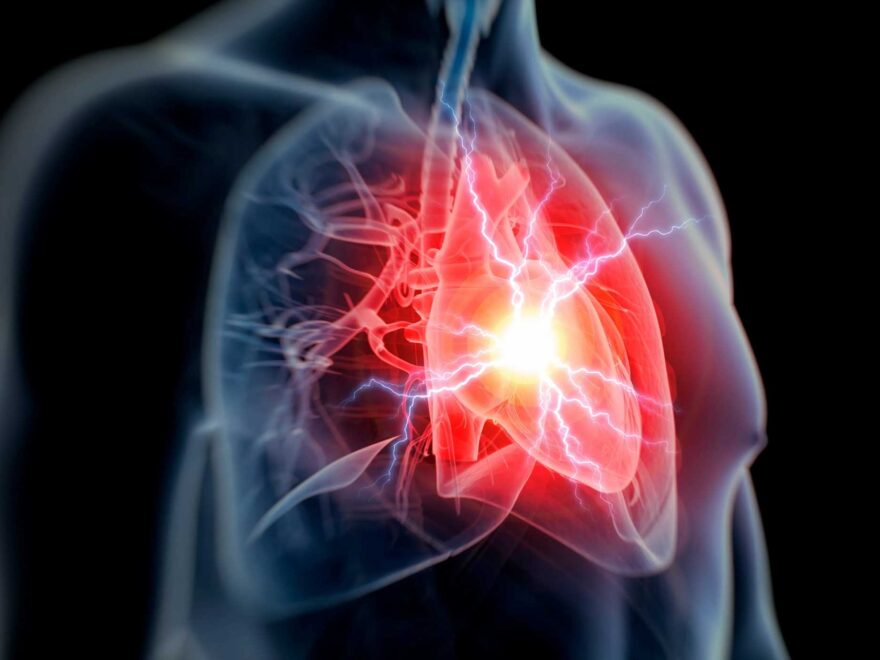HEART problems are typically associated with symptoms in the chest area, for obvious reasons.
But several cardiovascular health issues can manifest themselves in other parts of the body, making them dangerously easy to dismiss.

These warning signs include feeling sick, leg cramping, swollen ankles and bloating.
Dr Rigved Tadwalkar, a cardiologist at Providence Saint John’s Health Center in Santa Monica, California, told HuffPost: "The common thing we are concerned about is chest discomfort.
"But the truth is that cardiovascular issues can actually be signalled by other symptoms."
Here is a breakdown of some of the most common heart problems and the key signs – that aren't associated with the chest – to look out for.
READ MORE ON HEART HEALTH

‘Silent killer’ symptom is different in men & women – here are the telltale signs

How old is your heart? Simple quiz reveals your risk of heart attack or stroke
Heart disease
Coronary heart disease (CHD) is a common but serious condition where the blood vessels supplying the heart are narrowed or blocked.
Most commonly, it causes chest pain – but there are other, less obvious symptoms, according to the British Heart Foundation (BHF).
These include:
- Feeling sick
- Stomach pain or indigestion
- Feeling sweaty
- Leg cramping
- Arm pain
- Jaw pain
- Back pain
- Choking sensation
- Swollen ankles
- Extreme fatigue
Most read in Health

I'm a nutritionist – these are the 'healthy' foods that could be harming you

I was paralysed from waist down but now I've had a miracle baby with my 'nurse'

Fury over woke NHS poster that says asking someone's name is transphobic

We’ve battled prostate cancer like Eastenders’ Alfie, here’s what men must know
Around 2.3million people in the UK have CHD, BHF figures show.
It is one of the major main causes of death and disability, but it can often be largely prevented by adopting a healthy lifestyle.
The NHS says simple changes such as stopping smoking, eating a balanced diet, exercising regularly and maintaining a healthy body weight can make a big difference.
Heart attack
Heart attacks happen when the supply of the blood to the heart is suddenly blocked.
It is a serious medical emergency and needs to be treated as soon as possible.
Typically, heart attacks trigger symptoms like chest pain and shortness of breath.
David Newby, Professor of Cardiology at the BHF Centre of Research Excellence at the University of Edinburgh, said: "It’s usually described as a heaviness, tightness or pressure in the chest.
"People will often describe it as ‘an elephant sat on my chest’ or ‘it felt like a tight band around my chest,’ that sort of constricting feeling."
But experts suggest some people may also experience:
- Pain in the neck, jaw, back, arms or stomach
- Feeling sick
- Vomiting
- Sweating
- Lightheadedness
- Sudden feeling of anxiety or panic
- Excessive coughing or sneezing
- Wheezing
- Indigestion
Symptoms can come on suddenly, or they can persist slowly over several days.
If you think you are having a heart attack, you must dial 999 for an ambulance.
Heart failure
In the UK, heart failure, where the heart is unable to pump blood around the body properly, affects around 900,000 people.
Symptoms may start suddenly, or develop gradually over weeks or months.
The most common signs of heart failure are shortness of breath, fatigue, swollen ankles and legs, and feeling lightheaded.
But the NHS's full list of non-chest-related symptoms includes:
- Fatigue
- Swollen ankles and legs
- Feeling lightheaded and fainting
- A persistent cough (which might be worse at night)
- Wheezing
- Bloating
- Weight gain or weight loss
- Confusion
- Feelings of depression and anxiety
- Loss of appetite
It is important to see your GP if you experience these symptoms.
Arrhythmia
Arrhythmia is an abnormal heart rhythm.
It might be too slow, too quick, or irregular.
There are various different types of arrhythmia, including: atrial fibrillation, supraventricular tachycardia, atrial flutter, tachy brady syndrome and heart blocks.
Symptoms depend on what type of arrhythmia a person has.
But according to the BHF, the most common in the chest area include:
- Palpitations (thumping or fluttering in your chest)
- Chest discomfort
- Breathlessness
Away from the chest, someone may also experience:
- Dizziness
- Tiredness
- Weakness
- Feeling as if you may 'black out'
- Fainting
Most people with an abnormal heart rhythm can lead a normal life, but it is important to get it properly diagnosed and treated where needed.
Valve disease
Valve disease occurs when one or more of your heart valves don't work like they should.
It is therefore unsurprising that symptoms of the condition, which affects about 300,000 people in the UK, usually appear in the chest.
Signs include shortness of breath, discomfort in the chest area and palpitations (fluttering or pounding in the chest).
But the BHF says sufferers also report:
- Feeling weak
- Dizziness
- Swollen ankles and feet
- Being unusually tired
Read More on The Sun

I’m a mum & my hack turns a kid’s plane seat into a comfy bed

Future of Pizza Hut hangs in the balance as chain battles huge debt pile
Many people with heart valve disease can live a normal life.
But as with most conditions, everyone is affected differently so it is important to check in with your doctor.
Source: Read Full Article
